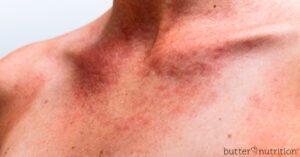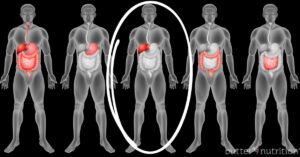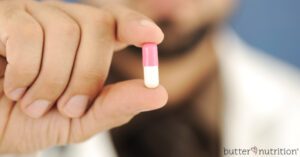
While blood sugar is not the most exciting topic, it sure does have a huge impact on how you feel throughout the day and how you sleep, not to mention the huge impact it has on your digestion, metabolism, and even your hormone levels.
Read on, and find out how to support your mood naturally through blood sugar balance.
Do any of these signs of poor blood sugar handling describe you?
- Awaken a few hours after falling asleep, hard to get back to sleep
- Crave sugar or coffee in the afternoon
- Sleepy in afternoon
- Fatigue that is relieved by eating
- Headache if meals are skipped or delayed
- Irritable before meals
- Shaky if meals delayed
- Frequent thirst or urination
These are all indications that your body may be having a difficult time managing blood sugar. Usually, blood sugar regulation is controlled by the liver and pancreas, but when those organs become over-burdened, blood sugar falls too low (hypoglycemia) and triggers your adrenal glands to get involved. The adrenal glands release stress hormones and signal the liver to break down proteins and fats for energy. This causes a lot of bodily stress and inflammation.
Why is blood sugar important? Sex hormones, digestion, and metabolism!
First off, healthy hormone production will not happen without blood sugar balance. Failure to balance blood sugar stimulates the release of the stress hormones cortisol and adrenaline. These stress hormones block the healthy production of sex hormones because reproduction is not a priority when your body is under stress (ie. your body prioritizes survival over reproduction).
Blood sugar is also important to digestion and assimilation. When your stress response is ON, your digestion is turned OFF for a similar reason, surviving stress is prioritized over your digestion.
If that's not enough of a reason to want to have balanced blood sugar, this one will seal the deal. Without balanced blood sugar, your body won't produce enough T3 (active thyroid hormone) to support a healthy metabolism!
How blood sugar goes wrong
Did you know your gut bacteria can increase the likelihood of insulin resistance?
An overgrowth of gram negative bacteria in the gut equate to more endotoxin (also called lipopolysaccharide or LPS).
How do you end up with more LPS-containing gram negative bacteria in your guts?
I'm glad you asked . For starters:
* Western diet, low in whole foods and fiber
* Antibiotics, as they 'kill' beneficial bacteria they create the environment for gram negative bacteria to thrive and overgrow
* Proton pump inhibitor (PPIs)
* Diets low in fiber and prebiotic foods (think fertilizer for your good gut microbes)
* Keto and carnivore diets (often low in fiber, but not always)
Countless studies have linked increased levels of LPS with insulin resistance.
Some tips to help regulate blood sugar naturally
- Make sure the fats in your diet are balanced to support healthy cell membranes. Rigid cell membranes can block sugar from getting into your cells and being used properly. Fatty acid testing (at home through the mail) is a great way to see if cellular inflammation is impacting your blood sugar balance.
- Always eat protein, fat, and carbohydrates TOGETHER. Often frequent feedings (i.e. 5-8 small meals a day) are needed to keep the body fueled and prevent the stress response. Pay close attention to the ratio of protein/fat/carbs in your meal, and how you feel after consuming. Most Americans overdo carbs and don't eat enough protein and fat to balance their blood sugar during meals.
- Taking this one step further, eat the carbs and sugars last (fruit included) and focus on eating the fiber, protein, and fat first (in that order)! This can have a profound impact on your blood sugar balance.
- Try going for a 10 minute walk after meals to help reduce insulin spikes after eating.
- Eat enough calories to support your body and its natural desire for health. Skimping on calories raises your stress hormones and makes way for blood sugar swings.
- Actively try to reduce stress in your life, especially when eating. Stress decreases your digestive juices that help your body break down and assimilate food. This includes doing more of what you love, and less of what you don't!
- Get your gut health on point to decrease LPS that could impact blood sugar balance. Need help learning how to change your gut? Look no further than the How to Build a Bulletproof Gut Masterclass

Do you have any blood sugar handling strategies that didn't make our list? Please share them below in the comments!
PIN IT:
References:
- https://pubmed.ncbi.nlm.nih.gov/21636801/
- https://diabetesjournals.org/diabetes/article/56/7/1761/12590/Metabolic-Endotoxemia-Initiates-Obesity-and
- Signs and Symptoms From A Functional Perspective by Dicken Weatherby






Leanne Olsen says
Totally agree with the need to snack often! I usually eat every two hours and feel great! Miss just one snack, though, and it can throw me off for the next few days. 🙁 And reducing stress is super important as well. Increased stress levels will cause my blood sugar to crash like there's no tomorrow! If all else fails to level me out, something high in sugar and carbs will usually stabilize me temporarily so the protein/fat can get to work! Thank you for posting about this, as a lot of people don't realize how serious hypoglycemia can be.
Emily says
I like your article, although I'm not sure your carb/protein/fat ratio is correct. Did you know that Sweden (after pouring over all the data) just recommended that their citizens adopt a high fat (good fats like coconut oil, animal fat, butter, olive oil) low carb diet? Your title is misleading since moody, irritable, and anxious can be other things as well, notably low serotonin which can be fixed with supplementation of tryptophan or 5HTP. Also, adding glutamine can really help with low blood sugar. To learn more about all of the issues at play here and fixing them (a lot through amino acid supplementation), I would highly recommend reading The Mood Cure or The Diet Cure by Julia Ross. I went to her amino acid therapy class this summer and was really impressed. She recommends 20-30 grams of protein (mostly animal/fish) per meal. You can also go on her websites http://www.moodcure.com and http://www.dietcure.com to learn more and take her quiz to see what you're deficient in. Surprisingly you need to go to both her pages for all the info (the research/articles are great).
anon says
How about cutting back or avoiding SUGAR, especially processed foods that contain it. This should be the #1 priority for people who can relate to this article.
Serrah says
This is very bad advice for some. I did low carb for 2+ years because I trusted my drs and nutritionist who had me so scared of sugar. My insomnia and hypoglycemia got worse than ever and my anxiety was way up. After I added sugar back in i started sleeping so well and finding myself relaxed through the day. I can literally feel my body switching from adrenaline to learning to use food as fuel .
Cutting out sugar may be right for some but it's wrong and dangerous for others.
jean pierre says
down right
Susanna Giers says
You mention eating protein/fats/carbs together. is it okay to eat just protein and fats, or just protein and carbs? Or is it best to include all three?
Jana says
I don't think so. You're running on outdated information. Check out this:http://nutritionfacts.org/video/lipotoxicity-how-saturated-fat-raises-blood-sugar
mike says
all food produces a blood sugar spike. Sugar is the worst though and that comes in many forms including fruit.
Michala says
I read this blog because I recently had an eye opening scare with blood sugar issues. I was so used to feeling crappy I had no idea my blood sugar was so off until a random test at a local event showed a blood sugar level of 38. Not good. After a doctor visit and daily testing resulting a crazy blood sugar numbers I started doing my research because I don't want use insulin if I can manage it naturally. I've followed all the good tips in this blog and have also started taking green coffee from perfect supplements.com because it has been known to regulate blood sugar. I've been testing everyday and have been having great levels and feeling sooooo much better!!! I only wish I had known about the issue much earlier so I didn't spend so much of my life feeling so crappy!
Kate Edwards says
Thanks for your article. I didn't know what I was experiencing for many years was a blood sugar issue - hypoglycemia - until 12 months ago. That's how long I have been doing a metabolically supportive diet.. But not until a few months ago I craved some rice pudding, so made some and it actually started keeping my blood sugar headaches at bay. That's what is working for me. Everyone is different. I also discovered that in place of fresh liver ( I just can't stomach it) I am taking dessicated liver capsules. Somehow, they are keeping blood sugar balanced too - no headaches. I don't have to feel sick most days. Very relieved 🙂 PS my blood work NEVER shows there is any problem with blood sugar., so not diagnosed, but the symptoms and how I feel are very clear.
Jose says
How many spoons you will consider something good to balance with great lakes gellatin in a daily basis?
Karl says
Not exactly responding to the comments raised are we now?